- Home
- Upton Sinclair
O Shepherd, Speak! Page 16
O Shepherd, Speak! Read online
Page 16
The harbor had been cleared of mines, and the naval auxiliary Catoctin was waiting for them. The party spent the night on board, and in the morning Lanny had the pleasure of making a flight in that wonderful new plane, “The Sacred Cow.” A thousand miles to the Deservoir Field, which lies by the Great Bitter Lake, a part of the Suez Canal. Fighter planes accompanied them—the Armed Forces were taking first-rate care of their “Cominch.” The Quincy was waiting there, and that was like getting home. Lanny was interested to see what the war had done to a cruiser; it was hard to walk on the decks for the ack-ack guns that had been stuck here and there.
F.D.R. was a tired man, and looked thinner than ever; but there were visitors he felt he had to see. First came the King of Egypt, a young snip whose principal joys in life were eating and racing about in American motorcars. He stayed for three hours, including a hearty lunch. Roosevelt told him to raise more long-staple cotton, much needed in America, and presented him with a two-motored transport plane. Egyptian neutrality had been valuable in the days when Rommel’s hard-bitten troops had been standing at El Alamein, less than eighty miles from Alexandria. It wasn’t so important now that Rommel was dead—killed in an automobile accident, so the papers had it, but later it was learned that he had been ordered to take poison, having been involved in the attempt on the Führer’s life.
Later in the afternoon came another dark-skinned potentate, who stayed for tea. The thin and frail old Emperor of Ethiopia presented a contrast to fat young King Farouk. Haile Selassie, Conquering Lion of Judah, claimed to be a direct descendant of King Solomon and the Queen of Sheba, and maybe was. Mussolini had killed his people with poison-gas bombs and driven the Emperor into exile; now he was back, and eager for close relations with the powerful President of the great republic overseas. He had gold in his country and presented the President with a gold cigarette case and a gold globe. In return he received something much more useful—four American automobiles.
XIII
Next day came the really big show, one of the oddest that Lanny had ever witnessed in his much-traveled life. An American destroyer, the Murphy, had made a journey of some eight hundred miles to the port of Jidda, where it had picked up a third Oriental potentate, whose difficult name in Arabic was ’Abd-al-’Azīz ibn-’Abd-al-Rahmān al-Faisal ibn-Su’ūd, King of Saudi Arabia. He was a very important potentate indeed, for he owned what was perhaps the greatest oil pool in the world, and was being paid some fifteen million dollars a year in royalties—no pun intended. His oil was the lifeblood of the American defense forces in the Mediterranean area, ships, planes and tanks, and so Ibn Saud could have anything he wanted to make him happy.
What he had wanted was to bring along his two sons, his brother, his Minister of Finance, his Deputy Minister of Foreign Affairs, his Minister Plenipotentiary to Great Britain, his Privy Counselor, his Physician, his Astrologer, his Imam, or Chaplain, his Commander of the Guards, his Adjutant of the Guards, his Assistant Minister of Finance, and so on, for a list of forty-seven persons, not forgetting the Official Food Taster and Caterer, the Royal Purse Bearer, and the Chief Server of Ceremonial Coffee. He wanted this company to live in the style to which they were accustomed, and this meant turning the deck of the Murphy into a desert-Arab encampment. Nobody would go below, for they were an open-air people.
The first thing was to cover the fo’c’sle of the destroyer with brightly colored awnings and to spread many thousands of dollars’ worth of fine rugs on the deck. The nights being chilly, there were many charcoal braziers, very picturesque. Then there must be food for the party, so they brought a flock of sheep which were pastured on the fantail of the vessel, and Negro slaves wearing large silver earrings cut the throat of one of them every now and then. Most people had the impression that slavery had been abolished throughout the world some time ago, but when a king is also an oil magnate he can carry on a semi-secret slave trade across the Gulf of Aden, and his slaves are not automatically set free when they board an American war vessel. Or maybe they were free but nobody mentioned it to them!
Now came the Murphy, to take its place alongside the Quincy. F.D.R. was sitting on deck, and Lanny came to him and whispered that he really must not miss the sight. This great man was eager for fun; he wheeled his chair to a position behind a stanchion, so that he could hide and watch the show. He shook all over with laughter, and had to put his hand over his mouth to keep from being heard during the transfer to the cruiser. Having been fed on fat sheep, His Majesty was an enormous man. He was in his seventies, badly crippled, and walked with difficulty; also, he was half blind, because of cataracts. He looked like something on the Metropolitan Opera House stage, in flowing black robes and a red turban with gold head ropes and a sort of tailpiece hanging behind.
His guards accompanied him, and they wouldn’t move unless and until the Secret Service men also moved; they all went away together, leaving the two rulers with only an interpreter. Afterward F.D.R. told Lanny that this old Arabian was the toughest proposition he had ever tackled; he hated the Jews and was not the slightest bit moved by the President’s appeal for those hundreds of thousands who had fled from the Nazis and wanted to get into Palestine. But host and guest preserved the amenities; Ibn Saud presented the President with four Arabian costumes, and one each for his wife and daughter. Roosevelt presented the King with a two-motored transport plane and, more important yet, with the wheel chair for which His Majesty had expressed admiration. Fortunately there was an extra on board the cruiser.
XIV
Dispatch planes brought mail and newspapers, and the tired man worked on these while the vessel sailed through the Suez Canal and the Mediterranean to Alexandria. He had a long sea voyage before him, but this he loved, and he was hoping to catch up with his manifold duties. The stack of documents which had been piled up in his cabin made Lanny’s heart ache; a President of the United States just couldn’t go away from home for a month without being swamped under the accumulated load. Nobody else could sign documents for him, and if he made a single mistake there were thousands of Republican eyes watching, eager to exploit the opportunity.
This was the longest period that Lanny had ever spent with his Boss, and he did what he could to make himself agreeable. He couldn’t help with the documents and correspondence, but at mealtimes and rest periods he tried to divert Roosevelt’s mind with cheerful topics. Every evening they had a movie, the latest products, gladly loaned by’ the studios. “When Irish Eyes Are Smiling” was a long way from the war, both geographically and spiritually; it put no strain on anybody’s mentality and gave great pleasure to Michael F. Reilly.
But nothing could keep the President’s mind off Europe for very long, and he picked Lanny’s mind for details and for guesses as to what might lie before the world. Would Hitler give up when the Rhine had been crossed, or would the Allies have to fight all the way to Berlin? And what would the Führer do personally: would he be taken alive, or would somebody kill him, or would he kill himself? Would there be any way to reach Göring and persuade him to turn against the gang? And what was the answer to the difficult question of immunity to be promised to any of these gangsters?
Lanny said he had never dared to put the idea of defeat before any of them. Hitler had become persuaded that if he were captured the Allies would lock him in a cage and put him on public exhibition. His plan was to retire to the Alpine Redoubt in the Bavarian Alps and make a last stand; undoubtedly the Nazis were building fortifications there and piling up supplies, but there were no factories in the region, and it wouldn’t take an army very long to use up what they had been able to store. When Roosevelt asked about the so-called “werewolves,” the threat of underground terrorism after the war, the P.A. said that the bulk of the Germans were law-abiding people, and if they got any sort of decent treatment they would surely not support criminals.
Said the President, “We will give them enough fighting to satisfy them; we’ll take no chances on their being able to say that it was a stab
in the back that defeated them. All the stabs will come from the front.”
“From the two fronts,” said Lanny with a smile. By this time the Russians had overrun the whole of Silesia, a district second only to the Ruhr as a source of war materials—a hundred million tons of coal and eight million tons of steel every year, and many tank and munitions factories which the Allies had not been able to reach with their bombers. From such losses there could be no hope of recovery.
XV
The Quincy was due to stop at Algiers, and it had been arranged that Lanny was to take his departure there. General de Gaulle, now head of the French government, had been invited to consult with the President; but instead the American Ambassador came on board and reported that le grand Charlie had made lame excuses. The truth was his dignité did not permit him to travel to see anybody. He hated Roosevelt almost as much as any Wall Street tycoon hated him—Robbie Budd, for example.
This incident caused Mike Reilly to entrust Robbie’s son with an account of what had happened when these two strong-willed men had had their first meeting, during the Casablanca Conference. They had talked in French, and Mike didn’t know French, but he knew an enraged man when he saw one, and as he watched the Frenchman’s long nose coming nearer and nearer to the American’s projecting chin, he had considered it his duty to draw his pistol and hold it in his hand for the half-hour the interview lasted. The Secret Service chief was half hidden behind some drapes, and neither of the two men knew what he was doing. It was the first and only time that Mike had had occasion to do this in the four years that he had been guarding the President.
Lanny thought it was just as well that F.D.R. didn’t have to undergo the ordeal of another interview with that hysterical Frenchman, who called himself a successor to Joan of Arc and whose mind had come straight out of that period of history. When the time came for the P.A. to leave the deck of the cruiser he exchanged a strong handclasp with his friend and said, “You have done a grand job, Governor. Take a rest now and delegate the hard work.”
F.D.R. did not say “To whom?” He was too tired for joking. He just smiled wanly and said, “I’ll try.”
BOOK THREE
Come the Three Corners of the World in Arms
8
O Peuple Deux Fois Né!
I
In Paris the presidential agent found a letter from Laurel, saying that she was still waiting for the Army to get far enough into Germany to make it worth while for her to come. When he went to talk with the Monuments and the Alsos people he found the same thing: they were making elaborate preparations, but they hadn’t yet moved.
Monuments told him about those art treasures that had been left behind in the Bulge. As soon as the Third Army had driven the enemy out a couple of the experts had returned to the hunting lodge and found it burned to the ground—not a stick left standing. There was no way to know whether the Germans had done this on purpose or whether it was the result of shellfire. The wooden and stone saints were still in the hidden shed, but of paintings and other treasures there was no trace. Some of the parcels had been bound with wire and some of the boxes had had metal fastenings; a careful search for these was made in the snow-covered ashes, but without result. The presumption was that the Germans had carted the treasures away as soon as they had begun to have any doubt of being able to hold the district.
Lanny went to talk with the scientists. They were busy, for new information was continually coming in and new teams were being organized for research. A strange sort of job these learned professors had, part scientific, part military, and part detectical, if one may coin an adjective for which the language has no equivalent. They were making material for a whole sequence of movie melodramas, mystery stories, whodunits; the sort of thing that Woodrow Wilson had used, and that F.D.R. still used, to put himself to sleep at night. But it surely didn’t put any of the Alsos physicists, biochemists, biologists, astronomers, engineers, and what-nots of the Alsos mission to sleep at any time, day or night. They got along fairly well so long as they were out in the field where nobody could get hold of them; they were less happy in Paris, where they might receive alarming pink radiograms from Washington, marked TOP SECRET, and worse yet, stamped ACTION COPY, which meant that there was a time limit on it, perhaps as little as twenty-four hours. And what if the action was wrong?
General Groves in Washington—known as “GG”—was a military man, and his staff was composed of military men, corporation executives, lawyers, and such, and they found it hard to understand nuclear physicists and their ways of working. How could physicists know so much which they couldn’t explain to military men, corporation executives, and lawyers? How could they say, in advance, that this German physicist was important, while that German physicist couldn’t possibly be of any use whatever? How could they say that if the Germans actually had an atom-bomb project, Werner Heisenberg and none other must be the head of it? Soldiers, corporation executives, and lawyers were shifted around and told to do what they were told; might not the Nazis have done the same thing with their A-bomb people? “Yes,” replied Professor Goudsmit, “but in that case their A-bomb plant won’t be worth bothering about. It is Heisenberg or nobody.”
II
The Germans, overlooking nothing, had had their own Scientific Intelligence group in Paris, using as camouflage a firm and business called “Cellastic.” Oddly enough, they were in the Rue Quentin Beauchart, right next door to the supposedly secret American OSS. They had cleaned their place out but hadn’t been able to conceal the fact that they had had soundproof rooms and interphones of a special type which could not be tapped. Also, they had left a lot of litter around, including a floor plan with the names and technical interests of the various occupants. A doorman’s list gave the names and addresses of callers, and a switchboard record gave a list of call numbers. All that was straight out of the latest detective-story magazine, and so was the use of this information in the tracing down of traitor scientists in Holland.
Or take the story of Professor Joliot-Curie, son-in-law of the Curies who discovered radium. He was a leading nuclear physicist, and the Germans confiscated his Paris laboratory. The rumor spread that he was collaborating with the Nazis, and he let it stand that way, for he was secretly helping the Resistance. The Germans sent a competent physicist, Dr. Gentner, to take charge of the laboratory, and Gentner was an anti-Nazi at heart, a man who had worked in California with the inventor of the cyclotron. Gentner knew about Joliot’s political activities and protected him from the Gestapo. Later the Alsos people uncovered a Gestapo report on the German physicist, who had fallen under suspicion because his wife was a Swiss. Gentner was recalled to Germany, and managed to get word to Joliot in Paris, warning him that the man who took Gentner’s place in Paris was a genuine Nazi and to be on guard against him.
Movie plots all ready but the shooting script! In a French internment camp for German civilians the Alsos came upon a German chemist who had saved all his notebooks, which were full of valuable information. A Jew who had fled to Switzerland, the Nazis had lured him back by promises of special treatment, which promises they did not keep. He had ducked out of Berlin and got to Paris after a series of adventures which warmed Lanny’s heart—they were so much like Lanny’s own.
Also there was the great mystery of the Auer-Gesellschaft, a great German chemical concern; it appeared to be an A-bomb matter. There was a French company called Terres-Rares, which dealt in rare chemicals and owned a monopoly on the world’s supply of thorium; Auer had taken this company over and hurriedly removed all its thorium to Germany. This element could be used in a late stage of A-bomb manufacture, so Washington went crazy with fear and kept hounding Alsos to trace the matter down among the French employees of Auer and find out what the Germans had meant to do with the thorium.
So began an elaborate research, a study of catalogues and scraps of letters, also a telephone list obtained from the French government; it was learned that two former employees were now in the Belgia
n town of Eupen, just north of the Bulge. Alsos went there, brought the two culprits to Paris, and put them through a grilling. Alsos couldn’t give any hint of what they were looking for, and the employees couldn’t imagine what all the excitement was about. It turned out that the Auer people had been collecting thorium in order to prepare for the end of the war, when they would no longer be making gas masks and other military products; they had a patent on a toothpaste containing thorium oxide, supposed to make the teeth shine, and they were planning to go in for American-type advertising. Like Bob Hope, promoting Irium toothpaste!
III
One important group of Alsos was on the trail of the V-1s and V-2s, the robot and rocket bombs which were still wreaking damage in London, and the dread V-3s which might be starting up any day. The launching sites of rockets were mostly in Holland, the British and Canadian zone of fighting, but the factories and laboratories might be anywhere, and these were the most eagerly sought targets of the whole Army. The son of Budd-Erling looked back upon the days when he had been helping in this field and laid stress upon the idea that German labor, especially the Social Democrats, would have knowledge of locations and processes and techniques. Nothing could be hidden from the men who had to do the work, and thousands must by now be cured of any Nazi infection they might have acquired during the past dozen years. One such worker might be able to pass the investigator on to a score of others.

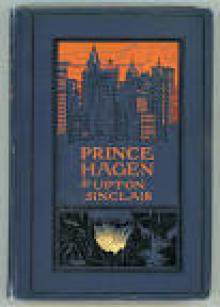 Prince Hagen
Prince Hagen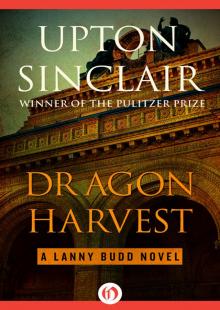 Dragon Harvest
Dragon Harvest The Jungle
The Jungle Sylvia's Marriage
Sylvia's Marriage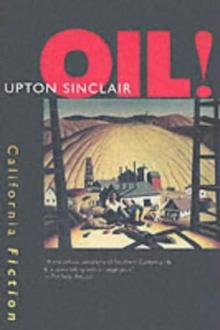 Oil! A Novel by Upton Sinclair
Oil! A Novel by Upton Sinclair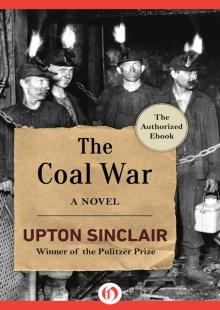 The Coal War: A Novel
The Coal War: A Novel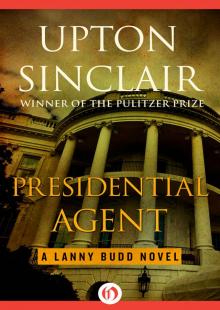 Presidential Agent
Presidential Agent World's End
World's End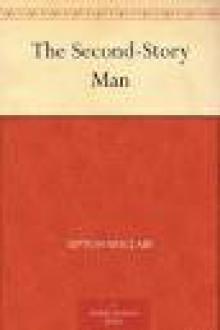 The Second-Story Man
The Second-Story Man O Shepherd, Speak!
O Shepherd, Speak!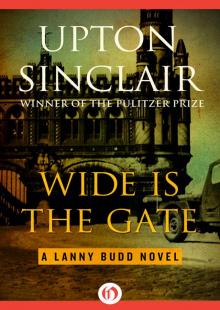 Wide Is the Gate
Wide Is the Gate The Return of Lanny Budd
The Return of Lanny Budd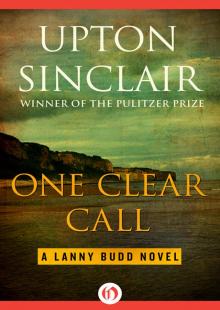 One Clear Call I
One Clear Call I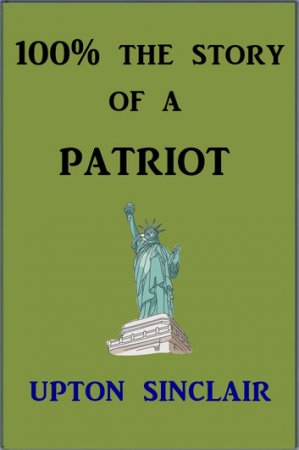 100%: the Story of a Patriot
100%: the Story of a Patriot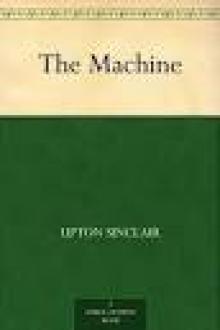 The Machine
The Machine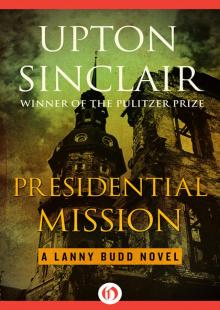 Presidential Mission
Presidential Mission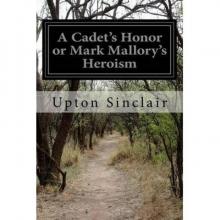 A Cadet's Honor: Mark Mallory's Heroism
A Cadet's Honor: Mark Mallory's Heroism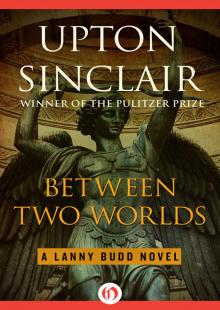 Between Two Worlds
Between Two Worlds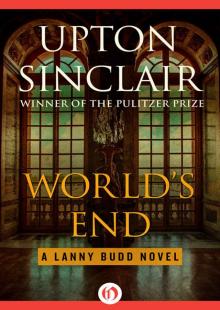 World's End (The Lanny Budd Novels)
World's End (The Lanny Budd Novels)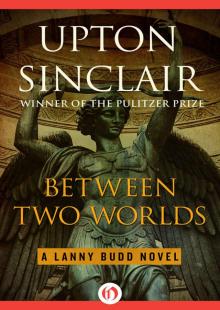 Between Two Worlds (The Lanny Budd Novels)
Between Two Worlds (The Lanny Budd Novels)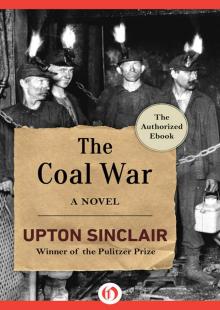 The Coal War
The Coal War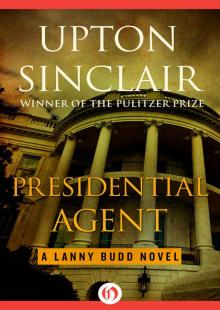 Presidential Agent (The Lanny Budd Novels)
Presidential Agent (The Lanny Budd Novels)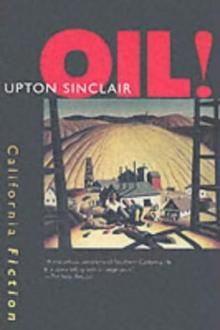 Oil (filmed as There Will Be Blood)
Oil (filmed as There Will Be Blood)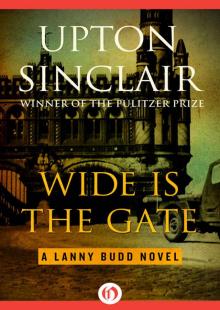 Wide Is the Gate (The Lanny Budd Novels)
Wide Is the Gate (The Lanny Budd Novels)